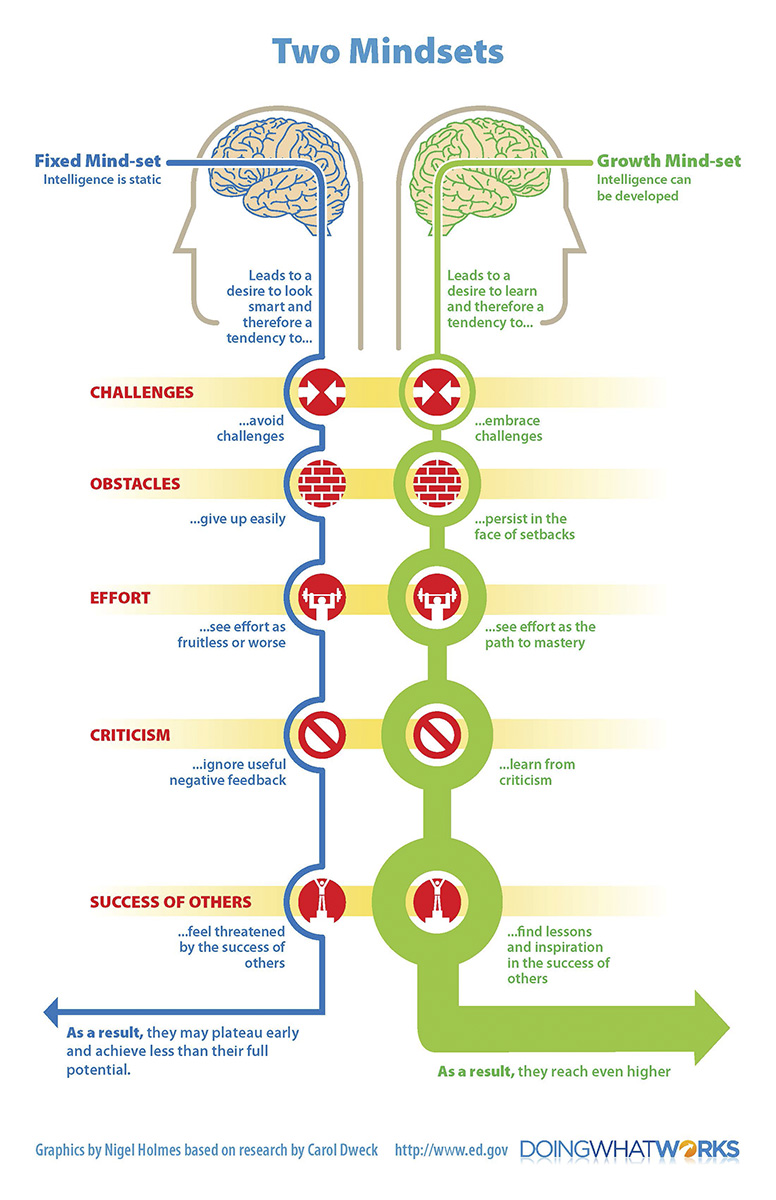
Helping Foster a Growth Mindset in Young Children
By Jaci Foged, Extension Educator in Lancaster County
“Mommy you do it … It’s too hard for me … I can’t do this … I don’t understand.” The struggle is real. I think it is safe to admit we all have had moments where it seems easier to ask someone else to do something or just give up rather than to keep trying.
Raising children can be difficult, and the pressure is on us to help our children be the best they can be. Too often, we might find ourselves jumping in to help the child accomplish something even though (with a little effort) they may be able to do it themselves. You might be thinking that jumping in and rescuing your child works for you. For instance, opening up the granola bar wrapper is relatively easy for you — but might take quite a bit of effort from your child. The child might whine or become frustrated when they cannot immediately open the wrapper. In the long run, our children need to be able to persevere, to fail and try again, to be disappointed and to put in the hard work.
CAREGIVING ADULTS
We might need to step back for our children to move forward.
Dr. Carol Dweck is a researcher at Stanford University. According to Dweck, there are two types of mindsets — a fixed mindset and a growth mindset. In a fixed mindset, people believe their qualities are fixed traits and, therefore, cannot change. These people document their intelligence and talents rather than working to develop and improve them. They also believe talent alone leads to success, and effort is not required. Alternatively, in a growth mindset, people have an underlying belief their learning and intelligence can grow with time and experience. When people believe they can get smarter, they realize their effort has an effect on their success, so they put in extra time, leading to higher achievement.
MINDSETS
Dweck has found that mindsets can change, and when a mindset changes, learners do better. History shows us there are a lot of famous people who have displayed a growth mindset. Michael Jordan was cut from his high school basketball team but went on to become a famous professional basketball player. The Beatles were rejected by Decca Recording Studios who said, “We don’t like their sound; they have no future in show business,” yet they went on to become a very popular group. Oprah Winfrey was demoted from her job as news anchor because she “wasn’t fit for television” yet she hosted the longest-running talk show on television which ran for 25 years. Growth mindset is real and attainable.
FOSTERING GROWTH
So how do we foster a growth mindset in the children we care for?
• Consider the language you are using with children. Words have meaning and communicate an important message to the receiver. The language we use tells others what to believe and what we think of them. Example, instead of saying, “It’s not that hard;” say, “You can do hard things.”
• Explain to children our brains can learn and grow. For young children, try reading stories to them which focus on growth mindset. Examples include Your Fantastic Elastic Brain by JoAnn Deak, The Most Magnificent Thing by Ashley Spires, Listening With My Heart by Gabi Garcia and The Dot by Peter H. Reynolds.
• Have daily learning discussions. Encourage children to be their best each day, to put their heart into their work. Remind children it is okay to start their day over whenever they need to. Failure does not mean we are finished; instead, see it as an opportunity to begin again.
• Encourage and model positive self-talk. If you notice your child being critical of themselves, ask them what they would say to a friend who is in a similar situation. Explain to the child it is important to treat ourselves with the same care and respect we treat others. It is small, but when a child tells you something (they cannot tie their shoes), add “yet” to the end of their statement. “You cannot tie your shoes, yet.”
• Encourage risk, failing and learning from mistakes. Remind children disappointment, setbacks and making mistakes are a part of growing up. Focus on effort by saying, “I like how you tried a new way to solve that.”